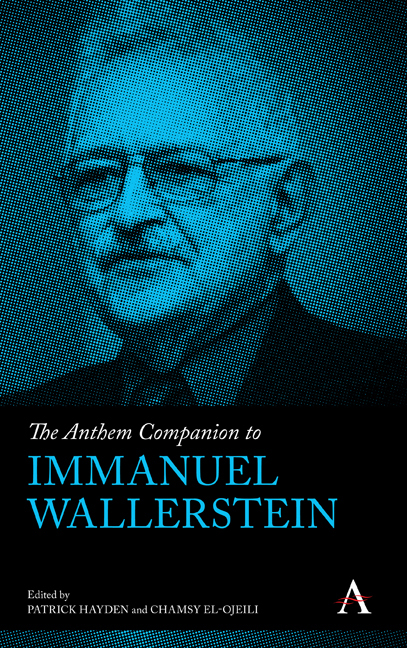Book contents
- Frontmatter
- Contents
- Notes on Contributors
- Acknowledgments
- Chapter 1 “There Is No Such Thing as Sociology”: Wallerstein as Sociologist
- Chapter 2 From Africa to the World: The Sources of Wallerstein’s The Modern World-System
- Chapter 3 Immanuel Wallerstein, World-Systems Analysis and the Structures of Knowledge
- Chapter 4 Wallerstein as International Political Sociologist: On Power, Hegemony and the Interstate System
- Chapter 5 The Agonies of Liberalism: Wallerstein on the Rise and Fall of Liberal Ideology
- Chapter 6 Global Inequalities Avant la Lettre: Theoretical Filiations and Radical Critique
- Chapter 7 Reckoning with Gender in the World-System: Insights from and Challenges to Wallerstein
- Chapter 8 The Past and Future of Antisystemic Movements: Possibilities and Limits of Social Change in Wallerstein’s World-Systems Analysis
- Chapter 9 The Global Environment and Climate Change inthe Modern World-System
- Chapter 10 Pervasive Pandemics: Understanding Global Healthand Disease from a World-Systems Perspective
- Index
Chapter 9 - The Global Environment and Climate Change inthe Modern World-System
Published online by Cambridge University Press: 29 February 2024
- Frontmatter
- Contents
- Notes on Contributors
- Acknowledgments
- Chapter 1 “There Is No Such Thing as Sociology”: Wallerstein as Sociologist
- Chapter 2 From Africa to the World: The Sources of Wallerstein’s The Modern World-System
- Chapter 3 Immanuel Wallerstein, World-Systems Analysis and the Structures of Knowledge
- Chapter 4 Wallerstein as International Political Sociologist: On Power, Hegemony and the Interstate System
- Chapter 5 The Agonies of Liberalism: Wallerstein on the Rise and Fall of Liberal Ideology
- Chapter 6 Global Inequalities Avant la Lettre: Theoretical Filiations and Radical Critique
- Chapter 7 Reckoning with Gender in the World-System: Insights from and Challenges to Wallerstein
- Chapter 8 The Past and Future of Antisystemic Movements: Possibilities and Limits of Social Change in Wallerstein’s World-Systems Analysis
- Chapter 9 The Global Environment and Climate Change inthe Modern World-System
- Chapter 10 Pervasive Pandemics: Understanding Global Healthand Disease from a World-Systems Perspective
- Index
Summary
Introduction
Immanuel Wallerstein's world-systems analysis (WSA) has profoundly influenced research and theory on global political economy and the environment. Wallerstein's insights on the modern world-system are vital to helping us achieve an accurate understanding of ongoing processes of environmental degradation and uneven consequences from the global to the local. His ideas also help us evaluate prospects for responding to challenges such as socioenvironmental inequalities and climate change in the contemporary world-system. Furthermore, the world-systems perspective helps us imagine social change and possibilities for future world-systems. In this chapter, I first review important components of Wallerstein's world-systems perspective. I then discuss examples of how each in turn is pertinent to issues related to the environment and climate change. I take a detailed look at ecologically unequal exchange (EUE) theory, which draws directly from insights from WSA (Wallerstein 1974a). I conclude by looking at what the world-systems perspective has to offer specifically regarding the global climate change crisis and possible future world-systems.
WSA
Influenced by and building upon critical development perspectives, Wallerstein encouraged the study of the global system from the perspective he called WSA. He argued that the appropriate unit of analysis is the world-system and that it is vital to take a historical, long-view approach (Wallerstein 1976a, 1979, 2000b). According to Wallerstein, analyses must be “simultaneously historic and systemic” (Wallerstein 2000b, xvii). Along these lines, Wallerstein wrote:
Man's ability to participate intelligently in the evolution of his own system is dependent on his ability to perceive the whole. The more difficult we acknowledge the task to be, the more urgent it is that we start sooner rather than later. It is of course not in the interest of all groups that this be done. Here our commitment enters. It depends on our image of the good society. To the extent that we want a more egalitarian world and a more libertarian one, we must comprehend the conditions under which these states of being are realizable. To do that requires first of all a clear exposition of the nature and evolution of the modern world-system heretofore, and the range of possible developments in the present and the future. That kind of knowledge would be power. And […] it would be power that would be most useful to those groups which represent the interests of the larger and more oppressed parts of the world's population. (Wallerstein 1974a, 10)
- Type
- Chapter
- Information
- The Anthem Companion to Immanuel Wallerstein , pp. 163 - 184Publisher: Anthem PressPrint publication year: 2023



